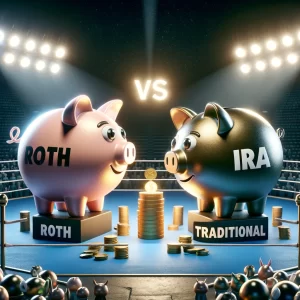Should You Make A Contribution In Traditional or Roth IRA?

Choosing Between Traditional and Roth IRA Contributions: Which is Right for You?
By, Jeremy Reif, CRPS
Traditional vs. Roth has been debated since the Roth IRA arrived in 1998. This is almost like the age-old question, what came first, the chicken or the egg? When should you pay your taxes, now or later?
Heck, even CPAs and investment professionals will give you different answers. The common public only wants a simple yes or no when it comes to which account to use. The most common answer from professionals is not a yes or a no, but they are asking for a client situation.
The correct answer is, it is super complicated. The professionals are asking the correct question by wanting to know more about a given client’s situation.
What is the difference between a Roth and a Traditional IRA?
Traditional IRA – tax-deferred investment. When a contribution is made, there is an income tax deduction. The contribution is then invested. This investment, including the Growth, is not taxed until a distribution occurs. Retirement is defined as age 59 ½ or older for normal distributions. 100% of the distributed amount is considered taxable income for the year in which the distribution was taken.
Roth IRA – There is no tax deduction for contributing. This Money is also invested. The investment, including the growth, is not taxed again if it is distributed at the normal retirement age of 59 ½.
The biggest difference is if you need a present-day tax deduction or tax-free income later.
Common Financial Education:
Most schools taught people that while in your peak earning years, defer income while in higher income tax brackets. The hope is that during retirement they will be in a lower income tax bracket.
The challenge:
- Tax laws change. Tax rates can go up or down depending on who is elected president. Tax rates have been lower since the 2001 Bush tax cuts.
- As our National Debt rises, how does the US pay it back?
- How do interest rates affect our Nation’s Debt?
- How is Medicare, Medicaid, and Social Security funded?
- Is it more likely for taxes to go up or down in the future?
Real Life:
As life unfolds for you and your family, it is possible that the strategy taught in school works out as planned. What if it doesn’t? Several things can change someone’s financial outlook:
- Pension– Income could be the same or similar as when working. For some people who have pensions, they might have been in a lower income tax bracket while working.
- Spousal Inheritance – If one spouse passes away, typically the well spouse is the beneficiary of the deceased spouse’s investments. Instead of filing taxes as married filing joint, now they are filing as a single filer. This means that taxes could go up in the future.
- Inheritance – People don’t necessarily count on receiving an inheritance. Depending on the type of account that is inherited, this could affect the beneficiary and their taxes.
- Lifestyle – Some people save all their lives so that once they retire they can go on a spending spree. Depending on where they take money from will greatly change the landscape of their taxes.
- Tax law changes – tax changes can come with the flick of a signature from the president. Several government-assisted programs are in real financial trouble. It could be an easy fix to raise income taxes.
It has been argued by some that no money should ever go into traditional retirement accounts and that people should use Roths whenever possible. The real answer lies somewhere in between and actually should be custom-tailored to your financial situation. It would be wise to hire a professional to double-check the work you did yourself or to put together a customized plan for your family. Best of luck incorporating Roth IRA’s into your financial future.
Links:
https://fiscaldata.treasury.gov/americas-finance-guide/national-debt/
https://www.medicare.gov/about-us/how-is-medicare-funded
https://www.medicaid.gov/medicaid/financial-management/index.html
Originally Published on https://pointwealthmanagement.com/blog/
























